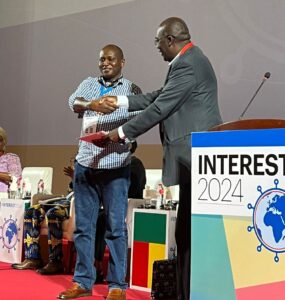Background and methodology
In 2008 nine African Universities and four African research institutions, in partnership with non-African institutions started the Consortium for Advanced Research Training in Africa (CARTA) to strengthen doctoral training and research capacity on health in Africa. This was to respond to the need of the African continent to have well trained and networked researchers, capable of responding to challenges in public and population health (Ezeh et al., 2010; Frantz et al., 2017; Izugbara et al., 2017). Researchers agued that interdisciplinary collaborative research is particularly essential for public and population health to address the multifaceted determinants of health and to describe and understand the local context in which interventions are proposed or evaluated (Fonseca, Sampaio, Fonseca, & Zicker, 2016; Fonn, 2006). Therefore, training programs that create opportunities for collaboration can make a valuable contribution to the African health research landscape (Frantz et al., 2017; Olaleye et al., 2014; Vasquez, Hirsch, Giang, & Parker, 2013).
CARTA recruits PhD fellows from any discipline as long as their proposed research topics address public and population health. CARTA brings the fellows together regularly through four four-week Joint Advanced Seminars (JAS) which supplement the discipline-specific PhD training they get at the universities where they register for their PhDs. The JAS curriculum is multidisciplinary, and it is jointly developed by the senior academics and researchers from both the African and non-African consortium members. The JAS expose the fellows to the contribution of collaborative research across disciplines and geographies; and creates networks between fellows from different partner institutions, and between fellows from different disciplines within and between the partner institutions.
We conducted a study to describe particular aspects of the CARTA program that promotes collaboration between the PhD fellows in the program, and to determine the patterns of collaborative publications that resulted from the intervention. To achieve this purpose, we analysed 806 peer-reviewed publications reported by CARTA fellows to the CARTA Monitoring and Evaluation office.
What we found
Overall we found that writing multiple author papers is common among CARTA fellows and graduates as is to be expected, given usual practice in the disciplines that usually contribute to health research. Further, we observed that CARTA fellows co-published beyond their traditional research fields in multidisciplinary, cross-cohort and cross-institutional teams. Fellows are writing with each other, mainly within their institutions but across disciplines and CARTA cohorts. Also, fellows from different institutions are publishing with each other, but this is less common.
What we learnt from CARTA fellowship
CARTA’s efforts to build cross-cohort, cross-institutional and multidisciplinary collaborations were realised by recruiting fellows from multiple disciplines and different institutions, and organizing cross-institutional and cross-cohort seminars and encouraging cross-institutional registration. We found that this did result in publications between fellows and in particular across institutions and disciplines. While we cannot say this is greater or less than other intervention as we do not have a counterfactual, it does confirm other research which indicated that for collaboration to be effective structured interventions are recommended (Wu et al., 2019; Yu, Shao, He, & Duan, 2013).
Importantly, collaborative publications were produced even after fellows had left the formal CARTA program after graduating. This has the potential to sustain cross-institutional collaboration among African partner institutions beyond the CARTA program.
Of particular interest is that inter-cohort and interdisciplinary publications from within the same institution were a common joint output. This has immediate applicability, as universities can immediately set up mechanisms to facilitate such contacts within their institutions; joint inter-departmental meetings and joint PhD seminars can be initiated at minimum cost as can linking junior PhD students with senior students.
Further, the number of cross-cohort publications within and outside fellows’ institutions may be an indication that cross-cohort mentorship was useful, time will tell if this contributes to long-term research collaborations among CARTA fellows.
We conclude that the interventions of the CARTA program have potential to stimulate collaborative-minded researchers on the African continent. CARTA induced collaborative research publications on health-related issues among African researchers, both CARTA and non-CARTA researchers.
Investing further in this practice can be deliberately encouraged even after the fellowship to enhance peer-learning and research capabilities, and produce quality and productive researchers on the African continent.
Keywords: Collaborative publications; networks; doctoral intervention; post-doctoral intervention; Africa.
Reference
E Fonseca, B. de P. F., Sampaio, R. B., Fonseca, M. V. de A., & Zicker, F. (2016). Co-authorship network analysis in health research: Method and potential use. Health Research Policy and Systems, 14(1), 1–10. https://doi.org/10.1186/s12961-016-0104-5
Ernawati, R. (2013). Facing Urban Vulnerability through Kampung Development, Case Study of Kampungs in Surabaya. Humanities and Social Sciences, 1(1), 1. https://doi.org/10.11648/j.hss.20130101.11
Ezeh, A. C., Izugbara, C. O., Kabiru, C. W., Fonn, S., Kahn, K., Manderson, L., … Thorogood, M. (2010). Building capacity for public and population health research in Africa: The consortium for advanced research training in Africa (CARTA) model. Global Health Action, 3(1), 1–7. https://doi.org/10.3402/gha.v3i0.5693
Fonn, S. (2006). African PhD research capacity in public health: raison d’etre and how to build it. Global Forum Update on Research for Health, 3(July), 80–83.
Frantz, J. M., Leach, L., Pharaoh, H., Bassett, S., Roman, N., Smith, M., & Travill, A. (2017). Research capacity development in a South African higher education institution through a north-south collaboration. South African Journal of Higher Education, 28(4), 1216–1229. https://doi.org/10.20853/28-4-396
Izugbara, C. O., Kabiru, C. W., Amendah, D., Dimbuene, Z. T., Donfouet, H. P. P., Atake, E. H., … Ezeh, A. C. (2017). ‘it takes more than a fellowship program’: Reflections on capacity strengthening for health systems research in sub-Saharan Africa. BMC Health Services Research, 17(Suppl 2), 1–5. https://doi.org/10.1186/s12913-017-2638-9
Olaleye, D. O., Odaibo, G. N., Carney, P., Agbaji, O., Sagay, A. S., Muktar, H., … Murphy, R. L. (2014). Enhancement of Health Research Capacity in Nigeria through North-South and In-Country Partnerships. Academic Medecine, 89(8Suppl), 139–148. https://doi.org/10.1016/j.physbeh.2017.03.040
Vasquez, E., Hirsch, J. S., Giang, L. M., & Parker, R. G. (2013). Rethinking health research capacity strengthening Emily. Glob Public Health, 8(1), 1–7. https://doi.org/10.1038/jid.2014.371
Wu, W., Xie, Y., Liu, X., Gu, Y., Zhang, Y., Tu, X., & Tan, X. (2019). Analysis of scientific collaboration networks among authors, institutions, and countries studying adolescent myopia prevention and control: A review article. Iranian Journal of Public Health, 48(4), 621–631. https://doi.org/10.18502/ijph.v48i4.983
Yu, Q., Shao, H., He, P., & Duan, Z. (2013). World scientific collaboration in coronary heart disease research. International Journal of Cardiology, 167(3), 631–639. https://doi.org/10.1016/j.ijcard.2012.09.134




